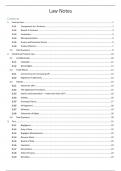Lecture notes
MGT388 Law for Engineers Notes
- Module
- (MGT388)
- Institution
- The University Of Sheffield (TUOS)
This study note provides a comprehensive overview of the basic law understandings that all engineers should know. This should help you understand what goes on in a real-life engineering situation
[Show more]



